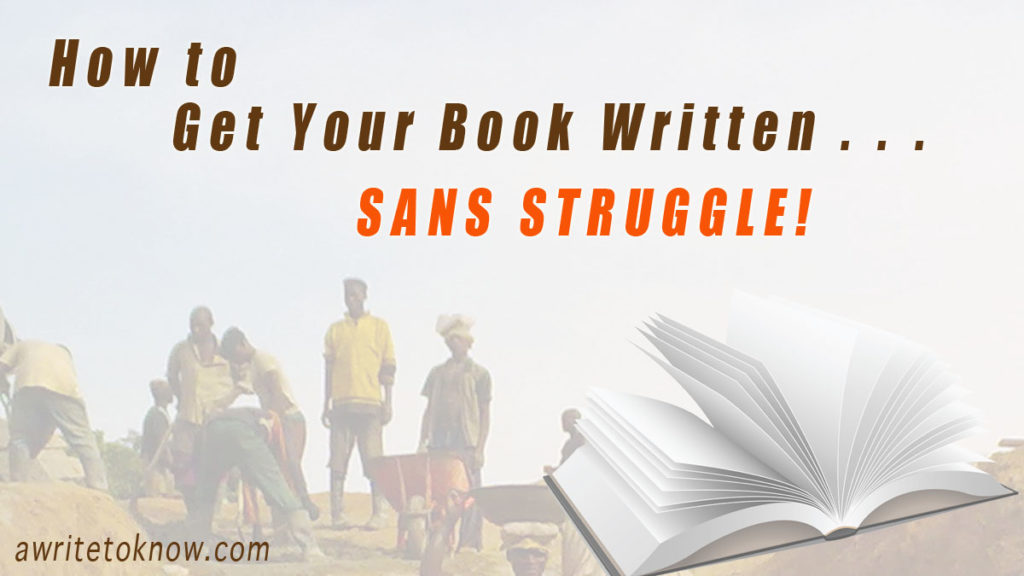A Book for Your Business—Investment or Waste?
Should you write a book to boost your business? Would it be a worthwhile investment of your time? What if it creates more demands, takes your focus away from running your business, and sucks up money that could be put to better use elsewhere?
All excellent questions.
If you’ve been around a while, you’ve tried a variety of strategies for growing your business. With competition increasing by the day and approaches that used to work falling into obsolescence, it can’t have been easy.
Even if you’re passionate about your products or services, running a business can be all-consuming. Faced with the need to drive traffic, get conversions and manage the myriad other tasks involved, it’s tempting to give in to overwhelm.
Still you keep plugging, hoping to find the strategy that’s going to move you ahead of the pack.
You Don’t Need a Book for Your Business IF …
You may have read articles by experts who advise against putting your time into writing a book, and perhaps you’ve decided you’re not a shoe-in for success as an author. You may be asking yourself, Does my business really need a book?
The answer, if you’re content with your current results, is “No.” Many successful entrepreneurs have never written a book (though many find it a satisfying way to give back to the world).
But if you’re looking to expand your outcomes, writing a good book is not only a good entrepreneur idea—it’s likely the best possible way to establish the credibility and exposure that will bring you the positive results you’re seeking.
The good news is, there are relatively easy ways to create a unique, top quality book that’s true to the business you’re passionate about and earns you all the benefits you’re looking for.
Please understand, I am not saying writing a book is easy. Writing is work. But the approaches outlined here will make the process easier and more rewarding.
Who Am I to Offer Book Writing Advice?
As a small independent publisher, writer, editor, and book designer, over the years I’ve helped a lot of clients get their books written, published and out to the world. I understand the many advantages of having a quality book, and it’s my business to be on top of book writing strategies that don’t take you away from running your business.
My goal here is to share all of that with you.
What You WIll Learn from This Article
In this article you will meet three of the many entrepreneurs whose books have boosted their businesses. Then I’ll show you ten ways your business will benefit from a book.
At that point, you’ll be presented three scenarios in which having a book is a killer entrepreneur idea. And finally, I’m going to give you seven proven strategies to ease the writing, all of which I’ve used myself and/or helped others use.
I’ll clue you in to ways you can leverage the expertise of others and get other experts to shoulder some of the workload, and I’ll introduce you to some helpful writing software (which I use) that you can use for free.
If that sounds interesting, read on.
3 Real-Life Examples:
Let’s start by looking at three entrepreneurs whose first books gave their businesses a real boost.
- Russell Brunson is one of my favorite examples. His first book, DotCom Secrets, detailed a wide variety of business funnels and how to build each one. A real eye opener for readers, it played a major role in making his ClickFunnels software company the fastest growing non-venture-capital-backed software company ever. Brunson doesn’t even sell the book; he gives it away. Yet he reports that every book he gives away makes him an immediate $32! How? He uses the book to introduce readers to his courses. (Brunson is so convinced of the power of a book that he’s gone on to publish at least two others.)

- A more common (though less spectacular) success story: Michael Wolf, a client of ours, wrote The First Time Home Buyer Book to help people new to the home buying game. The book was informative and served him well as a trust builder and lead generator. The positive results motivated him to write his second business boosting book, The First Time Home Investor Book.
- Another client wrote a revealing book on the use of art therapy in senior residences. She then used it to motivate other senior homes to include her art therapy programs in their patient care programs.
7 Hot Tips To Make Writing Your Book Easier
Chances are you’ve resisted taking the time to write and publish a book. Yet the sooner you get one in place, the sooner it will make all the areas of your business come together to create the life you dream of.
A plea: At least one of the naysayer blogers I’ve read asks you not to write a book because there are too many crappy books out there already. I agree! If a book is worth writing, it’s worth writing well. Don’t skimp on the professional help you need to make it a quality read.
Here are seven proven ways to make writing your book easier and more enjoyable, yet still end up with a quality product:
1. Write a short book.
Your book doesn’t have to be an opus. In fact, few people today will invest the time to read a long book. Yours should only be long enough to communicate your vision, what your product or service can do for the reader, and enough of the “how” to give them confidence it will work for them.
You should be able to do that in less than a hundred pages. You may manage to do it in sixty. Yes, that’s a skinny printed book, but it makes a perfect e-book. And these days, a thin printed book that says it all may actually get read!
2. Have a detailed plan for your book.
Resist the urge to just start writing. You’ll find yourself writing in circles, with no way to know when you’re done. A book is like a road trip. If you’re driving and you want to be in Chicago by midnight, you set your GPS, right? In the old days, you would have bought a map. You’re not just out for a Sunday drive—that’s journaling. If you want to get a book written, having a solid book planmakes everything easier.
3. Schedule specific times for writing.
Set up reasonable time slots for writing. You don’t have to be in a hurry; any project worth doing is worth taking your time on! You have a business to run, and that’s where the bulk of your attention needs to stay focused. So make a writing plan and stick to it. You don’t have to write every day. With a good book plan, you can average four pages an hour. So if you write just two hours a week, in three months you’ll have 100 pages.
One way to structure your writing is to plan your book in one- or two-page compartments. I wrote my second book this way, and ended each session with a wonderful sense of completion and accomplishment.
Write in timed bursts! I used to write for an hour or more at a time, but I find it’s more productive to slot 30-minute writing periods. I learned from a mentor, Gina Gaudio-Graves, the importance of using a timer to create a feeling of urgency.
When the timer goes off, I stop writing—even if I’m in the middle of a sentence. Knowing I have just half an hour kicks off something magical in my brain that focuses the mind, and I get more written. And the mind seems to work behind the scenes between sessions, so I’m ready to create when I sit down to write.
Another tip: Blogging your book, one piece at a time, is a great way to test your material. The comments people leave may give you new ideas, too.
4. Create your book from your own old blog and social media posts.
You probably have old articles you’ve written. Why not bring them together into a book? Yes, you may have to update them and write transitions from one to the next. You may even have to write a few new pieces to fill in the blanks. But if you’re passionate about your topic, you’ll love doing it.
5. Hire a professional ghostwriter.
If you have the funds to do this, it may be your best option. A reputable ghostwriter will begin by listening to your vision and goals for the book, consider any content you have on hand, and make recommendations based on the information you’ve provided. A talented ghostwriter can tell your story in your voice and communicate your passion to make you and your products and services irresistible to your target audience—and free you up to keep your focus on the running of your business.
If a ghost writer is beyond your budget, find a writer who creates superb content at highly competitive rates. Some ghost writer websites offer a second tier of excellent writers who are still building their portfolios and charge lower rates. Don’t settle for less here; insist on a writer who is interested in your topic, a good listener who can offer a fresh perspective and create persuasive, enticing content.
6. Co-author an anthology.
Invite two or three other experts to join you in the writing. Be sure they serve the same target audience you do, but are not your direct competitors. Co-authoring, you won’t feel like you have to write so much. As an added benefit, your part of the book will garner more eyeballs, generating significantly more influence than if you were the sole author. And it’s still your book—you’re the anthology editor, and that’s what goes on the front cover.
Another suggestion: Why not offer to conduct recorded interviews with your collaborators and have the interviews transcribed? (Like the rest of your book, of course, these interviews will require a professional edit.) Since most experts consider speaking less demanding than writing, this is an easier to attract them.
7. Helpful writing tools and courses to hone your writing.
I recommend the following writing courses and tools:
— Lisa Tener offers several wonderful programs for first-time authors that will get you off on the right foot and guide you all the way from beginning to end. There’s even one to help you find a traditional publisher should you decide to go that route. And here at A Write To Know, we offer a full line of services for authors—editing, ghostwriting, interior formatting, cover design, publishing and promotional help.
— The Pro Writing Aid Editing Toolis particularly useful for cleaning up your writing. It catches the problems that weaken your writing and suggests different wording to keep readers reading. The free version is a real steal, and the premium version gives you a lot more for $5 a month or less.
— Artificial Intelligence!Come on, I know you’ve been asking all the way through this article, “When are you going to get to AI, Chiwah?” Ah yes, AI. I love AI. I hate AI for putting people out of work, and fear it for how it may alter the future. But hey, it can be so awesomely helpful!
Here’s how I recommend using AI in writing your book:
-
- to jump-start your creativity and suggest sub-topics you might not have thought of;
- related to that, to stomp writer’s block into the ground;
- to offer insights that can lead you into new and interesting territory;
- to analyze data: AI can process large datasets and generate insights, which you can then interpret and present in your own style;
- to help you identify the strong and weak points in your writing. A friend of mine was able to upload his entire 260+-page manuscript into Claude Pro (claude.ai), and it shot back an impressive analysis of his writing that helped him further improve the book.
- to save you a lot of time with basic editing. That said, I highly recommend you tollow that up with a top-notch human editor! (It’s very likely your human editor will further improve your book. And if AI did such a great job that the book needs no further editing, a good human editor will tell you that.)
But … Don’t Go Crazy! AI Has Its Limitations:
-
- First of all, the quality of what you will get with AI is entirely dependent on the quality of your prompts.
- Second, AI is a profiient and very persuasive liar. If you use AI for research, be sure to verify the results.
- AI can write great prose, and some AI programs can even tweak the tone of the writing. But only you can inject your own unique personality into it.
- I’ve used AI for translation into other languages, with quite good results.
- AI is a good first-draft editor, and will save you money when you hire a human editor. But a top-notchhuman editor can improve further on your work.
For now at least, it is the human element in your writing that will set your book apart from all the rest. Use AI to enhance your own creativity and to save precious time you can better devote to other tasks.
Mix and match! The above strategies combine well, so use more thanone of them to get your book written. For example, you can blog any new elements you write to supplement your old social media posts. Or post the new material in social media, and get feedback on it there. You could also hire a writer to create new chapters to go with your old articles. And no matter how you get your book written, it’s a good idea to keep it short.
What’s Your Takeaway?
So … what have you learned from this article? Can you see how authoring a book might be doable … and a powerful strategy for boosting your business?
Yes, as with all good things, a book project comes with some costs. My final word on the writing (for now): The options outlined here will allow you to minimize your outlay of time and money, and you don’t need Russell Brunson or Brian Tracy results to make authoring a book profitable for your business.
• 3 examples of entrepreneurs who have used a book to boost their business, one eminently successful and the other two having enjoyed less of a wild ride but still enough success to move from where they were to where they wanted to be;
• 10 things a book can do for your business, from attracting better clients to making it easier to sell when you’re ready to cash out;
• 3 sample scenarios in which a book solves a problem common to many business owners;
• 8 timesaving, money-saving strategies for getting your book written:
I suggest you take some time to review these items and give some serious thought to getting your book written and published. When you’re ready to move forward, you’re welcome to call us at 442-615-0399 for a complimentary, no-obligation consultation.
As we’ve done for scores of other authors, we’ll happily guide you to discover your best path to authorship, the one most likely to take your business from where you are to where you want to be.
Founder, AWritetoKnow.com, GreenSongPress.com, EcoActive101.com, PetWrites.com
Facebook: https://facebook.com/chiwah.slater, https://facebook.com/thepluckyducky, https://facebook.com/ecoactive101
Pinterest: http://www.pinterest.com/chiwahslater
LinkedIn: http://www.linkedin.com/in/chiwah
Twitter: https://twitter.com/PetWrites
YouTube: https://www.youtube.com/channel/UCQvxaLnSFpXmtjWBd1fFEUw
PS—I only promote others’ products I believe in. I use the Pro Writing Aid daily and love it; no matter how good or bad a writer you are, it will improve your writing by alerting you to important details you’ve missed. I also recommend Lisa Tener’s courses, not because I’ve taken them but because I have followed her career since 2012 and I recommend her with confidence. I will make a small profit when you purchase Pro Writing Aid Editing Tool or any of Lisa’s programs or products, at no additional cost to you.





